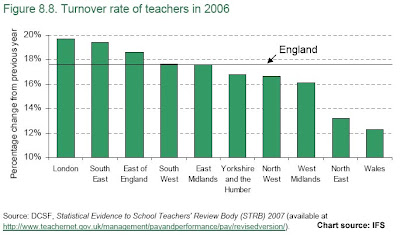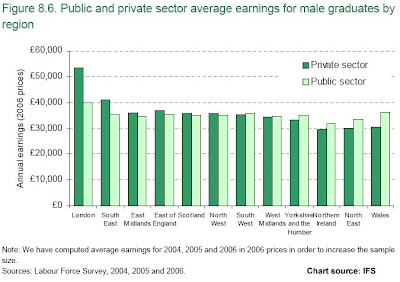One of the reasons we get such poor value from our public services is that government continues to operate national pay scales for its employees. National scales ensure we pay too much and too little, both at the same time. In London and the South East they mean that the public sector doesn't pay enough (despite some regional allowances) to attract and retain sufficient good quality staff. In the poorer regions they mean the public sector wastes money by overpaying.
We've blogged this before, drawing on work by Prof David Smith to highlight the gross inadequacy of current regional pay weightings for public employees:
"Smith shows how median earnings are getting on for 50% higher in London than they are in the North East (44.2% in 2005 to be precise). Even in the South East outside London they are nearly 20% higher.
Yet if we look at say the DfES teacher pay scales, even for Inner London we find the top of the main scale for classroom teachers is set at only 15% above the national scale (£33,936 compared to £29,427 nationally). And the premium for the London "fringe" is set at a meaningless 3%.
Such weightings don't reflect differences in the basic cost of living, let alone alternative employment options. As Smith highlights, ONS figures show that the general price level is 16% higher in London compared to the North East, and average house prices are an eye-watering 102% higher."
The Institute for Fiscal Studies has recently published its own analysis. They've computed average earnings in the public and private sectors for each region. The following chart shows the results for male graduates, the type of people needed in a lot of key public sector jobs, such as teacher.
As we can see, in London there is a big difference between earnings in the two sectors, with average public sector pay- including regional allowances- being c 25% below the private sector level. In stark contrast, public employees in Yorkshire and Humber, Northern Ireland, the North East, and Wales do very well. In Wales, they earn on average getting on for 20% more than their private sector counterparts.
For public services in London and the South East, there are a number of serious consequences.
First, staff recruitment is more difficult, which is reflected in higher vacancy rates. So schools and hospitals will be understaffed, or be forced to use expensive temps (we've blogged this before in the context of nurses see here and here).
Second, staff retention is more difficult, reflected in higher turnover rates. The IFS has produced the following chart showing wide regional variation in teacher turnover:
 As we can see, turnover in London schools is nearly 20% pa, whereas in Wales it's only 12%. Yet staff continuity is vital for any school to be successful.
As we can see, turnover in London schools is nearly 20% pa, whereas in Wales it's only 12%. Yet staff continuity is vital for any school to be successful.
Third, there is evidence that public sector staff differ quite markedly between the regions. For one thing, staff in London are on average younger and less experienced than those elsewhere: the IFS has found that 46.5% of teachers in London are aged under 40 compared with just 38.5% outside London. They comment:
"The characteristics of those delivering key public services differ quite dramatically across the country. Other aspects of the ‘quality’ of public sector workers may also vary as a result and there is some evidence that this makes a difference to outcomes in health."
What this all boils down to is that taxpayers in London and the South East are almost certainly getting worse public services than those elsewhere in the country. Their schools and hospitals will be staffed by less experienced and lower quality personnel, there will be more unfilled posts, and continuity will be low.
Against that, the poorer regions may gain correspondingly better staff. However, while that may work in picture-book market towns and scenic rural areas, it's most unlikely to extend to the real problem areas in our old industrial heartlands. And also, the presence of relatively well paid public servants pushes up local housing and other costs for those who have to work in the local private sector.
For taxpaying customers national pay agreements are an awful deal. As we've blogged before, we need a government that has the spinal equipment to take on the public sector unions and dismantle these seventies throw-back one-size-fits-nobody arrangements. It is a key condition for the fiscal decentralisation we so desperately need.

